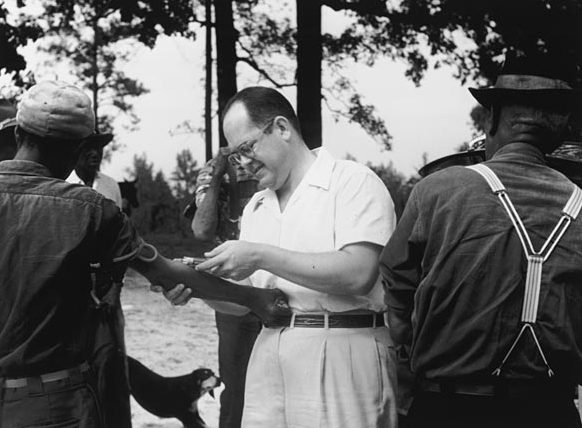
Genomic medicine is clearly on the horizon, and it’s likely to change healthcare. But there’s no shortage of challenges slowing progress: FDA regulations, data-sharing limitations, insufficient funding, and lack of research participants, to name a few. But the biggest obstacle, surprisingly, is what’s called “informed consent.” That’s what people need to agree to if they are to participate in research. It’s the bane of many a scientist, and esoteric enough that most of us aren’t even familiar with it. Right now, each of us has a unique opportunity to minimize this obstacle by speaking out for a change in how studies are conducted (more on that below).
Informed consent, and the institutional review boards (IRBs) that govern these policies, emerged out of the backlash to what is known as the Tuskegee syphilis experiment and other horrifying research in which people were infected or sliced open or psychologically stressed, usually without their permission or even knowledge. Government and society rose up together to protect research subjects. The National Research Act of 1974 established an oversight group for human research studies, and helped lead to the formation of IRBs at organizations that run such studies.
When a new study involving human subjects or data begins, scientists at most organizations must get it approved by an IRB; this involves writing a detailed informed consent document that thoroughly outlines every conceivable risk to participants. Informed consent policies aim to dictate not only how the current study may use resulting data, but how anyone else might use it later. In the interest of protecting people, such policies often prevent scientists at other institutions or other countries from using that data. People who join a study hoping to have a real impact may find that only the scientists running the project ever get to see and use the information gathered.
IRBs and informed consent have not evolved with how the world has changed, or with science, and it’s causing problems in genomics research. While 20th century research studies often involved dangerous activities, such as infecting people with deadly viruses, today’s genomic studies are far more benign: taking a blood sample to generate DNA sequence data, for instance. The degree of potential harm—at least immediate harm from being part of the study—is considerably less. But they are still governed by informed consent policies designed to assume the worst.
Another big change—one that never could have been foreseen when IRBs were first conceived—is our willingness to share information. Informed consent is the legacy of a pre-Facebook era, when it was widely assumed that people would never voluntarily share personal data; policies are designed to protect privacy at all costs. Today, scientists find that many study participants want to share data in ways that no IRB would ever approve.

This has been the source of discussions throughout the biomedical research community. It was a central theme at last month’s GET Conference (short for Genomes, Environments, and Traits) in Vienna, where I moderated a session on large-scale genomic studies (disclosure: the event organizers covered my travel expenses). I was surprised at how much informed consent dominated the conversation, but virtually nobody else was. Scientists and genome enthusiasts alike told me that informed consent—and what many see as its outdated, paternalistic policies—is a major barrier to progress in genomics.
The review boards were designed to be paternalistic, says Art Caplan, director of the medical ethics division at NYU Langone Medical Center. “They make their own risk/benefit determination,” he says. “They can, and are supposed to, say [if a project] is just too risky.”
This is where our unique opportunity comes in. For the first time in years, the U.S. Department of Health and Human Services has announced that it will revise the guidelines by which the boards judge the risk of a research study. It’s a major opportunity to establish new policies for studies like those in genomic research, where risk to participants is minimal.
Like many bioethics experts, NYU Langone’s Caplan favors a broad consent policy that would allow participants to give permission for a wide variety of uses of their data, for both the study at hand and future ones. He predicts that the upcoming guideline changes will include some “long overdue” reclassification to reflect that certain project types have minor risk. For some studies involving patients with terminal conditions, he anticipates an understanding that such people care more about driving cures than about protecting their data. “I think we’ll see a recognition that there are different situations,” he says. In some of those cases, he believes, “broad consent is likely to become the norm.” Such policies might allow data to be used in future studies, or potentially let scientists from other projects invite participants to be included in follow-up research.
For the next several weeks, HHS is welcoming public comment on these guidelines. You don’t have to be an expert to weigh in; sometimes the sheer number of responses can drive change. A broad consent policy would make each genomic study more valuable, and the combination of those studies—with more scientists able to access the data—would vastly improve our understanding of genomics and how to use this information for better patient care.
If you’d like to share your opinion about how IRBs and informed consent should be applied to future studies, here’s the website.
How Anybody Can Help Advance Genomic Medicine Now
Genomic medicine is on the horizon, and is likely to change healthcare. But there’s no shortage of challenges: regulations, data-sharing limits, funding, and lack of research participants, to name a few. But the biggest obstacle, surprisingly, is what's called "informed consent." That's what people need to agree to if they are to participate in research. And right now, each of us has a unique chance to minimize this obstacle by speaking out for a change.
















